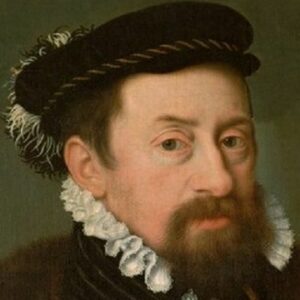Born to Ferdinand I and Anne of Bohemia and Hungary, Maximilian was a member of the Austrian family of Habsburg. He succeeded his father as Holy Roman Emperor ruler. He was crowned King of Germany, Bohemia, Hungary, and Croatia between 1562 and 1563. Maximilian’s religious inclinations and commitment to humanism created a great deal of anxiety among the nobility, who dreaded his conversion to Protestantism. As a result of his religious tolerance, he was even threatened with exclusion from the succession line. In addition, Maximilian’s religious beliefs put him in conflict with Philip, the son of Charles V, who was devoted to protecting Catholicism. Maximilian was unsuccessful in his political endeavors, but he was successful in establishing peace between Protestants and Roman Catholics. However, his efforts to overcome the denominational schism in order to access the Lutheran Imperial estates were utterly unsuccessful. During his reign, he was confronted with the continuous Ottoman-Habsburg warfare. The death of Maximilian occurred on October 12, 1576.
Childhood & Adolescence
Maximilian was born on July 31, 1527, in Vienna, Austria, to Ferdinand I, archduke of Habsburg, and Anne of Bohemia, and Hungary, princess of Jagiellon. He was the firstborn child of the marriage. His father was the younger brother of Charles V, Holy Roman Emperor.
Maximilian spent his formative years at the court of his father in Innsbruck. He was educated by humanist professors in Italy. Around the age of 17, he gained combat experience during the Schmalkaldic War against Francis I of France. Immediately thereafter, he began to engage in imperial affairs.
Much of his early life was in the public eye due to the intensifying conflict over the succession line of the Habsburgs. Initially, he was positioned behind Philip II of Spain, the son of Emperor Charles V. However, objections were raised because Ferdinand had already been named as the heir apparent.
Maximilian’s claim of succession was later acknowledged, and a solution was reached whereby Philip would replace Ferdinand and Maximilian would rule Germany throughout Philip’s reign.
In the latter half of the 1550s, his religious beliefs and sympathies were a source of worry, producing significant outrage. Maximilian’s leanings toward Lutheranism, cordial relationships with various Protestant rulers, and religious tolerance made people apprehensive of his commitment to Catholicism to the point that his father threatened to exclude him from the succession if he converted to Protestantism. Therefore, despite his inner desire, he stayed faithful to the Catholic faith and regularly attended mass.
Accession and Rule
Maximilian’s political career began in November 1562, when he was chosen King of the Romans by the Frankfurt electoral college. This occurred when he expressed his devotion to the Catholic faith. He was the first Roman king who was not crowned in Aachen. He has also crowned the King of Bohemia.
In September 1563, one year after being proclaimed King of the Romans, he was anointed King of Hungary by Nicolaus Olahus, Archbishop of Esztergom.
In 1564, following the death of his father, he succeeded him as King of Hungary and Croatia. In addition, he served as Holy Roman Emperor from 1564 until his death.
As King and Holy Roman Emperor, Maximilian’s top priority was a comprehensive reform of the Catholic Church. He granted Lutheran nobles and knights religious freedom in Austria, but he refused to award Protestant administrators of bishoprics with their imperial fiefs, dashing the dreams of Germany’s Protestant princes.
Over time, the difficult relationship between Maximilian and Philip of Spain substantially improved as Maximilian grew more circumspect about expressing his religious beliefs in public. He even attempted to seize the Spanish monarchy after the death of Philip’s son but was unsuccessful.
Maximilian urged a compromise between Catholics and Protestants in the Netherlands, but Spanish obstinacy left him with no choice. He fought a futile fight against the Turks in 1568, which ended in an agreement requiring him to continue paying tribute to the sultan.
Maximilian suggested an army reform in 1570, but it was rejected by the Protestant rulers of Germany. He proposed that the emperor should have ultimate control over the army and that his approval should be necessary for any soldier to be recruited for foreign duty within the empire.
However, the idea was rejected because German princes interpreted it as an attempt to restrict them from aiding their fellow-believers abroad. In addition, they did not wish to hand the emperor further authority.
In 1575, Polish and Lithuanian magnates selected Maximilian as a candidate for the position of King of Poland against Stephan IV Bathory, but his inability to achieve widespread acceptance led to his expulsion from Poland.
In stark contrast to his political shortcomings, Maximilian’s ecclesiastical initiatives were a resounding triumph. He effectively protected the religious liberty of the Protestant nobles. During his reign, Protestantism reached its highest point ever in Austria and Bohemia. Maximilian is also credited with facilitating the peaceful coexistence of Roman Catholics and Protestants.
Personal History and Legacies
Maximilian married Mary of Spain, daughter of Holy Roman Emperor Charles V, on September 13, 1548. The purpose of the marriage was primarily to build relations with the Spanish branch of the Habsburg family and to affirm Maximilian’s Catholic faith.
Mary, unlike Maximilian, was a devout Catholic who is dedicated to Habsburg Spain. Despite this, the two shared a deep affection for one another. They were blessed with sixteen children, one of whom died at birth. Two of his nine sons and six daughters held the title of Holy Roman Emperor.
Maximilian passed away at Regensburg on October 12, 1576. On his deathbed, he refused to receive the Church’s last sacraments. He was interred in Prague’s St. Vitus Cathedral.
Estimated Net worth
Unknown.


